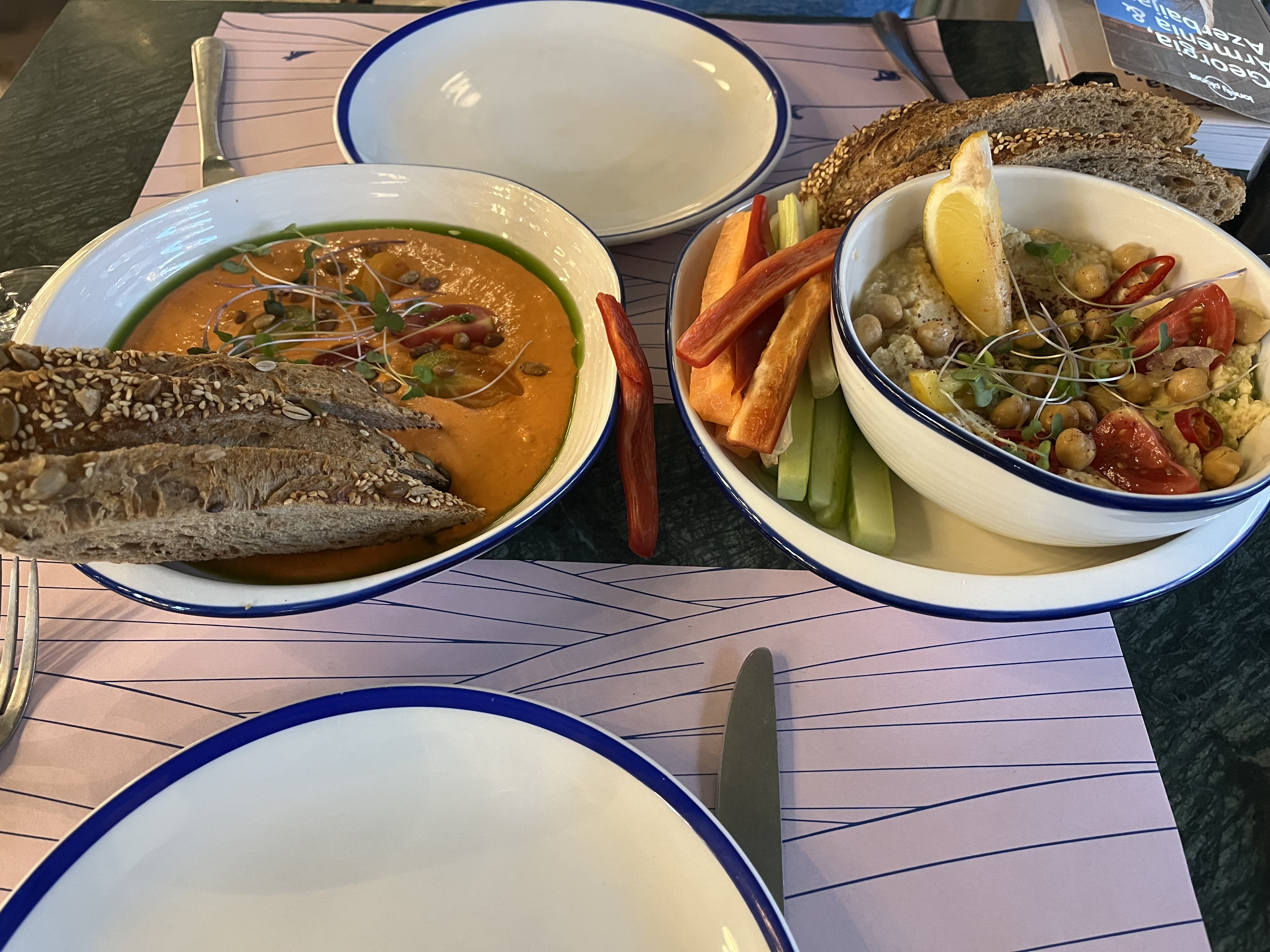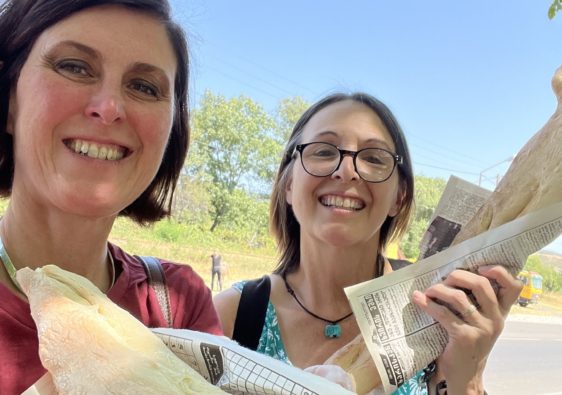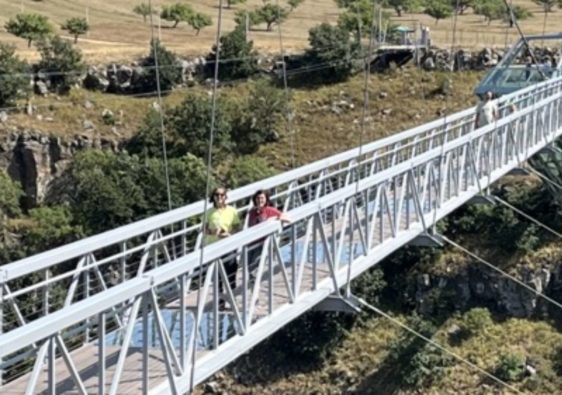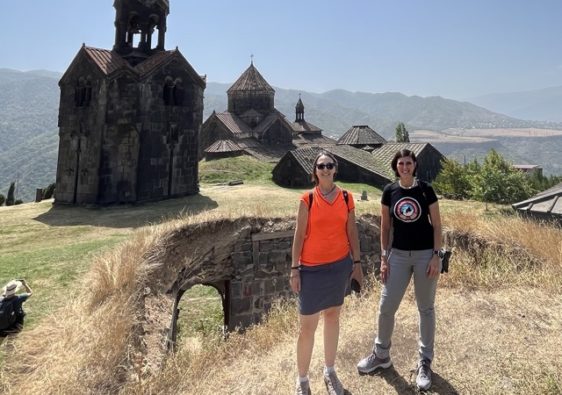Skip to Content
- Dress:
- Dress in Azerbaijan was more conservative – keep shoulders covered. The only women we saw wearing burkas or hijabs in Azerbaijan were tourists from other Muslim nations, like Kuwait, Algeria, Saudi Arabia, or Malaysia.
- In Georgia, standards were more casual and shorter skirts and tank tops were ok.
- In Yerevan, in the tourist district around Republic Square – everyone was dressed up and we felt distinctly out of place in our t-shirts and casual pants.
- Headscarves – we carried headscarves with us [any scarf will do] because they were mandatory for women in churches and mosques in both Georgia and Azerbaijan. There were generally scarves provided in each of the churches where they were required, in case you forget to bring one. In some places they had wraparound skirts to cover shorts or shorter skirts. They are lovely! [Note the baskets by the door for both skirts and scarves!] In Armenia headscarves were optional – at least where we were.
- Visas: For American citizens, visas were only required for Azerbaijan – which could be easily obtained online. But check the visa requirements online for each of the countries, as those rules can change regardless of your travel plans [we learned that first hand years ago when the rules for Belarus changed mid-trip!]
- Azerbaijan:
- If you plan to go to Armenia, go to Azerbaijan first. You will be questioned if you have an Armenian stamp in your passport. We did not talk about Armenia or mention our plans to go to Armenia while in Azerbaijan. Both of our guides described Armenia as an “enemy country”.
- No littering
- Carry your passport at all times – you can be fined if you don’t have it
- Language:
- All three countries have their own language. In general, many signs and menus are in the local language, plus English and Russian, but Russian is being phased out on signs and English is becoming the lingua franca for tourists visiting the countries. The older generation who grew up in the Soviet era used Russian and they were less familiar with English. The younger generation all seemed to know Russian, but did not want to use Russian and preferred English. We found English-speakers in all of the shops, restaurants, and tourist areas. Taxi drivers in particular did not speak much English, so we used our limited Russian with them, or used Uber or Bolt which makes speaking less necessary.
- Georgian is its own language and does not belong to another language family. It has its own alphabet as well [3 different scripts], which is now recognized by UNESCO on the Representative List of Intangible Cultural Heritage of Humanity.
- Azerbaijan – speaks Azerbaijani which is a variant of Turkish.
- Armenia – Armenia also uses its own alphabet, which is similar but different from Georgian. The word for thank you in Armenia is exceedingly long – so even the Armenians use “merci” versus the Armenian version.
- Money: Each of the three countries use their own currency, which are entirely different from each other, and have different conversion rates. Our recommendations:
- Download a currency converter app [I used Xe Currency app]
- Take out small sums from the local ATMs [figure out how much you want to take out in local currency before you step up to the machine]
- You can exchange Dollars or Euros in larger cities or airports, but don’t try to exchange Armenian money in Azerbaijan, or vice versa.
- Credit cards were more common in Tbilisi, less common in Baku and Yerevan. In general, the hotels and nicer restaurants accept them, but the little shops everywhere were often cash only.
- Call your bank before you leave and let them know you’ll be traveling in which countries, or check their requirements on travel notifications as this varies by bank. We had an unscheduled delay in Istanbul and ended up spending a day there, but because I [Michele] had not let my bank know about Turkey, no cash for me. Couldn’t call my mom & pop bank at home because it was 2 am there. Once I responded to the fraud alert text message I received, I was good to go, but that took an hour or two.
- Mobile phones – We’re based in the US, so Tauni paid $10/day for cellphone use abroad with Verizon and I have Google Fi, so mine works abroad and I just pay for the data I use. Good coverage pretty much everywhere we ended up in the Caucasus, both urban and rural.
- Daypack Must-Haves [be prepared for anything]: As we were taking tours and at the mercy of the tour schedules, we have found that it is best to always be prepared, and a daypack with a few necessaries is critical. We recommend:
- Water and a snack/sandwich. In Georgia and Azerbaijan, 2 of our tours simply did not stop for lunch. It was the strangest thing! Both stopped at a little grocery on the way so we grabbed up some cokes and chips to tide us over. We got smart after that 🙂
- Tissue packs & sanitizer – a must, as the “toilets” (often ‘squatty potties’) don’t always have toilet paper or soap.
- External batteries for your phone. Tours could last up to 12 hours, and we were using our phones for photos, videos, maps, etc almost nonstop so our batteries ran out quickly







